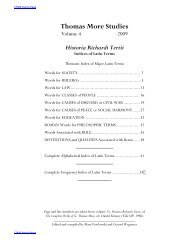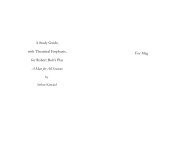life of john picus earl of mirandola - The Center for Thomas More ...
life of john picus earl of mirandola - The Center for Thomas More ...
life of john picus earl of mirandola - The Center for Thomas More ...
You also want an ePaper? Increase the reach of your titles
YUMPU automatically turns print PDFs into web optimized ePapers that Google loves.
Travelling from place<br />
to place wonderfully<br />
increaseth knowledge<br />
John Picus his<br />
disputations at Rome<br />
[57]<br />
8 <strong>Thomas</strong> <strong>More</strong>’s Life <strong>of</strong> John Picus<br />
as briefly as possible was, he comprised the effect <strong>of</strong> all that whole<br />
great volume and made a book, no slender thing to right cunning and<br />
perfect doctors. 1<br />
⌐ Of his Study in Philosophy and Divinity. ¬ After this, as a desirous<br />
ensearcherº <strong>of</strong> the secrets <strong>of</strong> nature, he left these common trodden<br />
paths and gave himself wholly to speculationº and philosophy, as well<br />
human as divine. For the purchasing where<strong>of</strong> (after the manner <strong>of</strong><br />
Plato 2 and Apollonius 3 ) he scrupulously sought out all the famous<br />
doctors <strong>of</strong> his time, visiting studiously all the universities and schools,<br />
not only through Italy but also through France. 4 And so indefatigable<br />
labour gave he to those studies that, yet a child and beardless, he was<br />
both reputed, and was indeed, both a perfect philosopher and a perfect<br />
divineº.<br />
⌐ Of his Mind, and Vainglorious Disputations at Rome. ¬ Now had he<br />
been seven years conversant in these studies when, ⌐ full <strong>of</strong> pride and<br />
desirous <strong>of</strong> glory and man’s praise ¬5 (<strong>for</strong> yet was he not kindled in<br />
the love <strong>of</strong> God¦) he went to Rome, 6 and there (coveting to make a<br />
show <strong>of</strong> his cunning and little considering how great envy he should<br />
raise against himself) ∆7 nine hundred questions 8 he proposed <strong>of</strong> divers<br />
and sundry matters, as well in logic and philosophy as divinity, 9 with<br />
great study picked and sought out as well <strong>of</strong> the Latin authors as the<br />
Greek, and partly fetched out <strong>of</strong> the secret mysteries <strong>of</strong> the Hebrews,<br />
Chaldees and Arabians, and many things drawn out <strong>of</strong> the old obscure<br />
philosophy <strong>of</strong> Pythagoras, Trismegistus, and Orpheus, and many other<br />
5 ensearcher examiner / 6 speculation speculative science, as opposed to practical science / 13<br />
divine theologian<br />
¦17 <strong>More</strong> omits ut palam fiet, “as will become clear” (CW 1:298, 299).<br />
1. right cunning...doctors: Translates consummatis pr<strong>of</strong>essoribus, “seasoned pr<strong>of</strong>essors” (CW 1:298, 299).<br />
2. Diogenes Laertius, Vitae philosophorum 3.6.<br />
3. Philostratus, Life <strong>of</strong> Apollonius <strong>of</strong> Tyana 1.18; 3.16-20, 34; 6.6, 19.<br />
4. “Picus left Bologna in 1478 and visited Florence and Ferrara be<strong>for</strong>e studying at the University<br />
<strong>of</strong> Padua from 1480 to 1482. From 1484 to <strong>earl</strong>y 1485 he was in Florence. He visited Sorbonne<br />
from July 1485 to March 1486 be<strong>for</strong>e returning to Florence, after which he went to Rome, in<br />
November, seeking to present his nine hundred theses.... In November 1487 he returned to<br />
France, where in 1488 he was arrested at Lyons on the orders <strong>of</strong> Innocent VIII” (CW 1:212).<br />
5. Vittorio Gabrieli comments upon the “telltale” character <strong>of</strong> this addition by <strong>More</strong> (47).<br />
6. Picus went to Rome November 1486.<br />
∆7. coveting...against himself: Here <strong>More</strong> significantly changes the Latin original--ostentare cupiens<br />
quanta eum a summussoribus in posterum manerat invidia, “in his desire to boast <strong>of</strong> how much envy he<br />
would later arouse among the grumblers” (CW 1:298, 299).<br />
8. Picus’ Conclusiones DCCCC publice dispudandae was published by Eucharius Silber in Rome on<br />
7 December 1486.<br />
9. <strong>of</strong> diverse...divinity: <strong>The</strong> Latin reads, de dialecticis & mathematicis, de naturalibus divinusque rebus,<br />
“concerning dialectics and mathematics, concerning natural phenomena and theology” (CW<br />
1: 298, 299).<br />
5<br />
10<br />
15<br />
20











